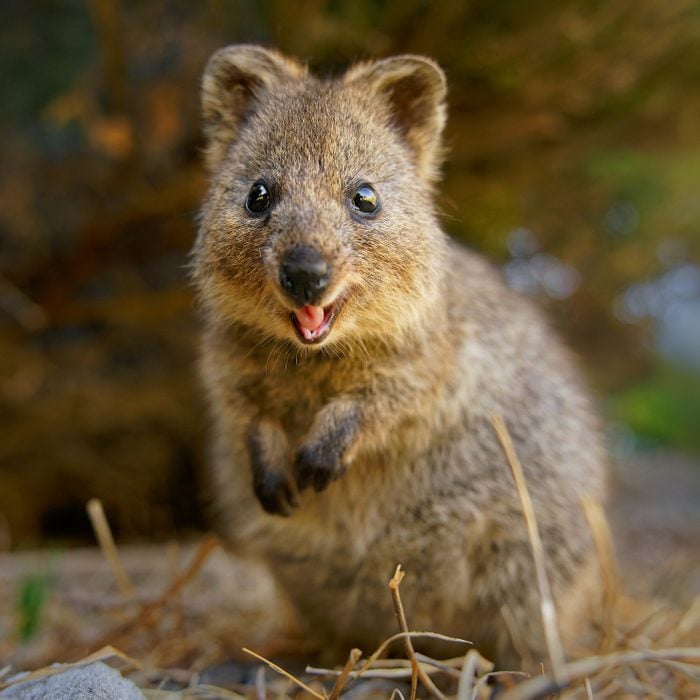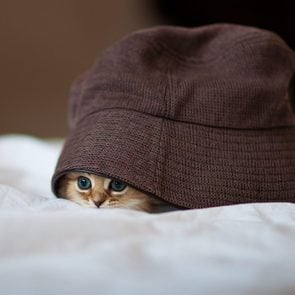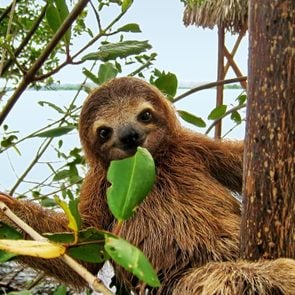This Is the Happiest Animal in the World—and It’s the Cutest Thing You’ll Ever See
Updated: Jul. 31, 2023

The most adorable creature outside of a Disney movie hails from a remote region of southwestern Australia. Find out why it's been dubbed the world's happiest animal.
There’s no shortage of bliss in the animal kingdom. Cats purr. Roosters crow. Dogs smile and wag their tails. Heck, the internet was built on cute and funny animal pictures! Yet even those who love interesting facts and animal trivia might not have heard of the creature who’s been dubbed “the happiest animal in the world,” maybe because the joyous furballs can be found in only one small region of southwestern Australia. But once you’ve seen their smiling faces, just try not to smile yourself.
Get Reader’s Digest’s Read Up newsletter for more adorable animals, humor, cleaning, travel, tech and fun facts all week long.
What is the happiest animal in the world?
While there’s no formal research on the topic, the happiest-animal-in-the-world title most often goes to the crazy-cute wallaby known as the quokka. Found exclusively in southwestern Australia—and mainly on the country’s remote Rottnest Island—quokkas are small, cat-size marsupials known for their curious natures and cheerful facial expressions. “They always look like they are smiling,” say Sally Hollis, corporate engagement officer for the nonprofit Rottnest Foundation, “so they’ve been referred to as ‘the happiest animal on earth.'”
Upping the cuteness quotient: Quokkas have plush, gray-brown fur, black button noses and round fluffy ears, which make them look a little like stuffed toys. Like their kangaroo cousins, they get around by hopping and bounding, and mama quokkas carry their babies in a pouch.
The earliest reference to the quokka’s status as the happiest animal in the world seems to date back to a 2013 story in the Huffington Post. But it was a 2019 Instagram post by Australian actor Chris Hemsworth posing with a quokka smiling that spawned a slew of quokka selfies and turned the species into a social media phenomenon.
Is the quokka actually happy?
View this post on Instagram
Well, it certainly seems that way—although experts admit that quokka “smiles” may have more to do with their facial structure than how they’re really feeling. That adorable quokka grin “is really just their resting face,” concedes Hollis. The quokka’s mouth is shaped in such a way that it just always looks like it’s smiling. And when quokkas stick out their tongues while grinning? They’re really just trying to cool off. Still, says Hollis, “they do also look pretty happy when they’re getting petted by tourists, so maybe they are actually happy!”
Are quokkas friendly?
Definitely. “The quokkas on Rottnest Island are very friendly and inquisitive, as they are used to people and don’t feel threatened,” says Hollis. “They are gentle and hop over to you to say hi.” Naturally curious, quokkas even sometimes pop into tourist selfies on their own because they’re intrigued by the camera. With no natural predators on Rottnest island, quokkas feel safe to mingle with humans as they please.
Can you keep a quokka as a pet?
View this post on Instagram
That’s a hard no. “Quokkas are a protected species,” says Hollis. Once abundant on the Australian mainland, quokkas were almost extinct by the 20th century, wiped out by predators like dingoes and foxes. (The lack of predators on Rottnest is what kept the quokkas there from dying out too.) The quokka is currently listed as Vulnerable on the International Union for Conservation of Nature (IUCN) Red List of Threatened Species, with a population of about 15,000 worldwide, including the more than 12,000 quokkas on Rottnest Island. But thanks to conservation efforts, their numbers seem to be rising again.
What other animals always seem happy?
If quokkas are the happiest animals in the world, one can’t help but wonder what the second-happiest animal in the world might be. Unfortunately, there hasn’t been any extensive research into the question, but plenty of other species have been found to display delight in the world around them.
Dogs
All that tail wagging has to mean something! With their puppy-like enthusiasm for new adventures and their hold-no-grudges hearts, dogs seems to understand the secrets to happy living. Wondering if your dog is feeling the joy? Check out these signs your dog is happy. That full-body wag is a very good sign!
Goats
Known for being social creatures, goats are happiest in the company of others (whether human or goat!), and they love to play. A recent study even suggested that they can recognize the difference between happy and unhappy human faces, choosing the happy ones most of the time. Judge for yourself how happy these goats look—they’re certainly adorable!
Monkeys
Humankind’s closest siblings in the animal world share our love of laughing and play. Studies of various types of apes suggest that they laugh while engaging in tickling and social play, much the way humans do.
Cats
While finicky felines may not initially come to mind as the world’s happiest animals, especially compared with smiling quokkas, cats are famously curious and find wonder in just about everything. And anyone who has ever known a kitten has seen the pure joy they find in play. If you’re wondering whether your cat is happy, just look out for purrs, slow blinks and the way they knead your favorite blanket in pure bliss.
About the expert
- Sally Hollis is the corporate engagement officer for the Rottnest Foundation, a nonprofit dedicated to preserving Australia’s Rottnest Island, home to the world’s largest population of quokkas. The foundation’s Adopt-a-Quokka program helps support quokka conservation projects on the island.
Sources:
- HuffPost: “Meet the Quokka, the Happiest Animal in the World”
- Royal Society Open Science: “Goats prefer positive human emotional facial expressions”
- Current Biology: “Reconstructing the evolution of laughter in great apes and humans”



